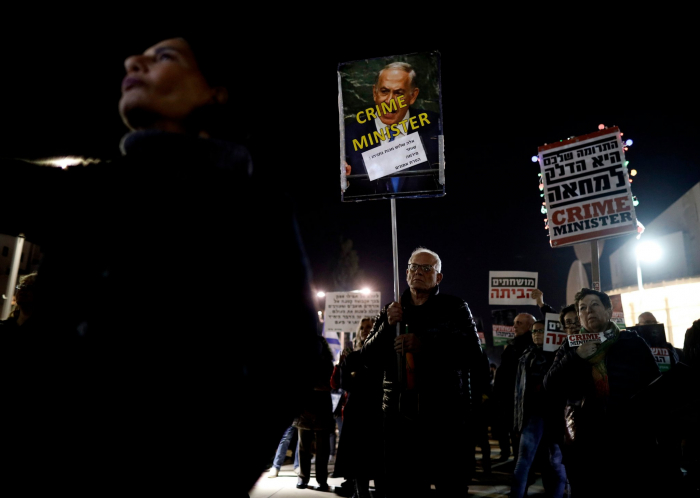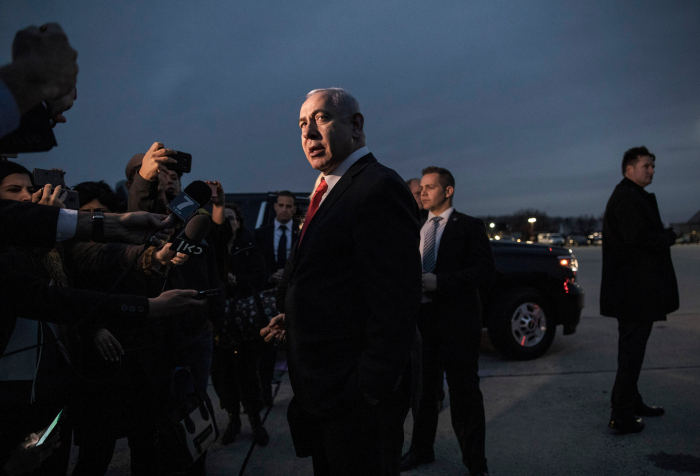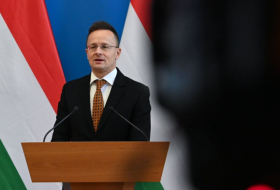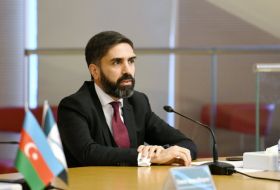Prime Minister Benjamin Netanyahu was indicted Thursday on charges of bribery, fraud and breach of trust in a set of long-running corruption cases, throwing his political future into doubt and heightening the uncertainty and chaos surrounding Israel’s fitful, yearlong struggle to choose its next leader.
Mr. Netanyahu, 70, who in July became the longest-serving prime minister in Israel’s history, now also has the distinction of being the first to be indicted while in office.
The cases against Mr. Netanyahu involve allegations of giving or offering lucrative official favors to several media tycoons in exchange for favorable news coverage or gifts worth hundreds of thousands of dollars.
The indictment threatened to open a dangerous new challenge to Israel’s democracy, as the nation’s top prosecutor and its premier accused each another of subverting the rule of law.
“The public interest requires that we live in a country where no one is above the law,” Attorney General Avichai Mandelblit said in a televised evening news conference.

In a defiant speech an hour later, Mr. Netanyahu insisted that the case against him was built on lies and political animus. He declared that it was the police and prosecutors who should be called to account, urging Israel’s citizens to “investigate the investigators.”
By turns fiery and maudlin, he told Israelis that they were “witnessing an attempted coup.”
“I will not allow lies to prevail,” he vowed. “I will continue to lead this country.”
WHAT’S NEXT FOR NETANYAHU?
Mr. Netanyahu is not legally required to step down. But with Israel’s political system already in uncharted territory, having failed to settle upon a new prime minister despite two elections and three attempts at forming a government since April, the criminal case against him could make it far more difficult for him to retain power.
After his chief rival, Benny Gantz of the centrist Blue and White party, failed to form a government by the Wednesday deadline, that task shifted to Parliament. If no lawmaker is successful in assembling a 61-seat majority over the next three weeks, a third round of elections will be called.
While Mr. Netanyahu has maintained strong support from his political base so far, polls have shown that a formal indictment would change many minds, including among many right-wing voters.
“We’ve seen consistently that a big majority of the public, about two-thirds, do not think a prime minister can serve and at the same time try to clear his name in court,” said Yohanan Plesner, president of the Israel Democracy Institute. In an October survey by the institute, nearly half of right-wing voters concurred.
There were already signs of unrest in Mr. Netanyahu’s right-wing Likud party, as a popular younger lawmaker, Gideon Saar, called Thursday for a primary contest for prime minister, and said he would be a contender.
Even if Mr. Netanyahu fends off intraparty challengers, and assembles a viable coalition in Parliament, Mr. Plesner said that the Israeli president, Reuven Rivlin, might balk at assigning him the task of forming a government while he awaits trial.
In addition, critics are expected to petition the Supreme Court to rule that Mr. Netanyahu must step down.

Existing law requires an ordinary government minister to resign when under indictment but whether that law applies to a prime minister has not been tested. There are also legal questions about whether the president may allow an indicted lawmaker to form a government.
The decision by Mr. Mandelblit to prosecute the prime minister capped a drawn-out process that has loomed over Israel politics for two years, weakening Mr. Netanyahu politically and emboldening the center-left.
Mr. Netanyahu has fomented right-wing anger at Israel’s judiciary and law-enforcement community for months, accusing them of trying to bring him down.
Alluding to that, Mr. Mandelblit warned against “violent and belligerent discourse against law enforcement officials,” which he called “playing with fire.”
“Law enforcement is not a choice,” he added. “This is not a matter of left or right. This is not a matter of politics.”
Mr. Netanyahu asked for the public’s sympathy, saying “my blood has been spilled,” along with that of his wife and son, in unfair attacks in the Israeli news media.
The corruption cases helped fuel the rise of the Blue and White party, led by Mr. Gantz, whose animating idea was that the allegations disqualified Mr. Netanyahu from continuing to serve.
Mr. Gantz issued a one-sentence statement late Thursday: “This is a very sad day for the state of Israel.”
The No. 2 official in Blue and White, Yair Lapid, was more pointed: “If he still cares about the country he should do one more thing for it,” he said of Mr. Netanyahu. “Resign.”
The cases have also slowly emboldened rivals within Likud.

Mr. Saar said that “it will not be reasonable” to expect that Mr. Netanyahu could succeed in a third election, after having twice failed to form a government and now with the additional baggage of criminal charges.
“We need to set a Likud leadership primary,” he said at a Jerusalem Post conference on Thursday. “I’ll be able to form a government and I think I will be able to unify the nation.”
Mr. Netanyahu, for his part, has focused enormous energy on persuading his supporters that the sprawling investigations were trumped-up and motivated by partisan bias, and on seeking to gain immunity from prosecution as long as he remains in office.
For months as the investigations dragged on, Mr. Netanyahu complained that the Israeli left, the news media and law enforcement agencies were conspiring to oust him by legal means because they could not defeat him at the ballot box.
In striking parallels to President Trump’s characterizations of the investigations against him, Mr. Netanyahu has called the investigation a “witch hunt,” and his allies have called it the product of a “deep state” conspiracy against Mr. Netanyahu — though Mr. Netanyahu himself appointed many of the key law-enforcement officials investigating him. Indeed, Mr. Mandelblit was once Mr. Netanyahu’s cabinet secretary, perhaps his closest adviser in the government.
The prime minister also seemed to work feverishly to use the legislative and political processes to aid his defense. Last December, he called a snap election for April, calculating that he might win a strong re-election mandate if the ballots were cast before Mr. Mandelblit announced whether he planned to seek an indictment.
Then, having scheduled the vote, he argued that Mr. Mandelblit ought to delay announcing his decision until after it, to avoid unfairly influencing the outcome.
Neither gambit worked: Mr. Mandelblit announced his intention to seek bribery and other charges 40 days before the April 9 vote.

After the April election ended inconclusively, Mr. Netanyahu’s allies pushed a bill in Parliament to give all members, including Mr. Netanyahu, immunity from prosecution. It was abandoned when critics, including members of his party, called the idea authoritarian and antidemocratic.
He also reportedly discussed seeking legislation to give Parliament the power to override a potentially unfavorable ruling by the Israeli Supreme Court, if a law granting Mr. Netanyahu immunity were challenged.
Again and again, Mr. Netanyahu sought to portray himself as a victim, in part as a way to keep his conservative political base united behind him. He petitioned unsuccessfully to bar evidence in the corruption cases from being published before the do-over election on Sept. 17. Failing that, he called damaging reports about that evidence a “terror attack against democracy.”
Finally, Mr. Netanyahu extracted repeated promises from members of Likud and of its allied right-wing and religious parties to stick by him and insist on entering a new government only if he remained prime minister.
It was vital to Mr. Netanyahu to stay on as prime minister, rather than agree to share power with Mr. Gantz taking the top job first, because if he held any post lower than prime minister, he would have to resign immediately if indicted.
Current Israeli law allows a prime minister to remain in office until a final court verdict, after appeals have been exhausted — a process that could take years.

That solidarity posed an insurmountable obstacle for Mr. Gantz and Blue and White, which finished narrowly ahead of Likud in the September ballot, but far short of a majority. On Wednesday, Mr. Gantz acknowledged that he had been unable to form a governing coalition.
The three cases against Mr. Netanyahu all involve trading official favors.
In the most serious, in which he was charged with accepting bribes, fraud and breach of trust, Mr. Netanyahu was accused of providing regulatory benefits worth hundreds of millions of dollars as a bribe to the parent company of Walla, a leading Israeli news website, for favorable coverage of the prime minister and his family, and rough treatment of his adversaries.
Bribery is considered the gravest corruption charge in Israel.
In the two other cases, Mr. Netanyahu was charged with fraud and breach of trust.
In one, Mr. Mandelblit said the Hollywood producer Arnon Milchan, an expatriate Israeli, along with the Australian billionaire James Packer, had sent hundreds of thousands of dollars’ worth of gifts to the prime minister’s residence in Jerusalem, including what he called a “veritable supply chain” of cigars and Champagne.
In return, Mr. Mandelblit said, Mr. Netanyahu had taken actions benefiting Mr. Milchan on a visa application, a tax exemption and a business merger.
In the other, Mr. Netanyahu was accused of discussing, though not consummating, another trade for favorable coverage. Prosecutors said that in calls with the publisher of Yediot Ahronot, one of Israel’s biggest newspapers, Mr. Netanyahu offered to press a competing newspaper, Israel Hayom, to curtail its free circulation, which was undercutting Yediot financially.
Israel Hayom is owned by Sheldon Adelson, the American billionaire casino owner who is a longtime supporter of Mr. Netanyahu’s.
Mr. Netanyahu’s lawyers sought to avert indictment at a four-day hearing in October. But Mr. Mandelblit said they had succeeded only in modifying the allegations against the prime minister, not refuting them.
Several other people were indicted in connection with the cases against Mr. Netanyahu, including the Yediot Ahronot publisher, Arnon Mozes, and Shaul Elovitch, the controlling shareholder of Bezeq, the parent company of Walla News.
The New York Times
















































